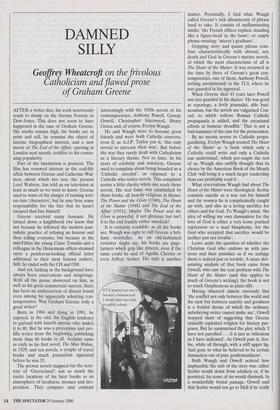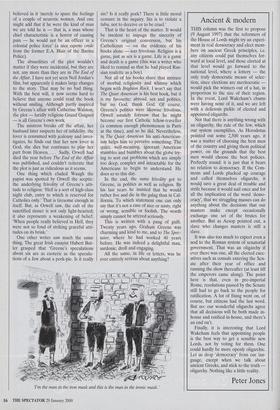DAMNED SILLY
Geoffrey Wheatcroft on the frivolous Catholicism and flawed prose of Graham Greene
AE 1ER a writer dies, his work notoriously tends to slump on the literary Footsie or Dow-Jones. This does not seem to have happened in the case of Graham Greene. His stocks remain high, his books are in print and sell, he remains the object of intense biographical interest, and a new movie of The End of the Affair, opening in London next month, testifies to his contin- uing popularity.
Part of the fascination is prurient. The film has renewed interest in the real-life affair between Greene and Catherine Wal- ston, about which her son, the present Lord Walston, has told us on television at least as much as we want to know. Greene used to warn of the danger of turning writ- ers into 'characters', but he may bear some responsibility for the fact that he hasn't escaped that fate himself.
Greene received many honours. He turned down a knighthood (we know that not because he followed the modern jour- nalistic practice of refusing an honour and then telling everyone, but because in the mid-Fifties the young Claire Tomalin and a colleague in the Heinemann offices steamed open a ponderous-looking official letter addressed to their most famous author). Still, he ended with the CH and OM.
And yet, lurking in the background have always been reservations and misgivings. With all the praise showered on him, as well as his great commercial success, there has been an undercurrent of dissent found even among his apparently admiring con- temporaries. Was Graham Greene truly a great writer?
Born in 1904 and dying in 1991, he enjoyed, in the end, the English tendency to garland with laurels anyone who makes it to 80. But he was a precocious and pro- lific writer from the beginning, publishing more than 60 books in all. Acclaim came as early as his first novel, The Man Within, in 1929; and ten novels, a couple of travel books and much journalism appeared before he was 35.
The prewar novels mapped out the terri- tory of 'Greeneland': not so much the exotic locations of his later books as an atmosphere of seediness, menace and des- peration. They compare and contrast interestingly with the 1930s novels of his contemporaries, Anthony Powell, George Orwell, Christopher Isherwood, Henry Green and, of course, Evelyn Waugh.
He and Waugh were to become great friends and were both Catholic converts, even if, as A.J.P. Taylor put it, 'this only served to increase their woe'. But before the war they rarely dealt with Catholicism as a literary theme. Not so later. In his years of celebrity and notoriety, Greene used to complain about being branded as a 'Catholic novelist', as opposed to a Catholic who writes novels. This complaint seems a little cheeky when one reads those novels. His real fame was established by three books, all heavily religious in theme: The Power and the Glory (1940), The Heart of the Matter (1948) and The End of the Affair (1951). Maybe The Power and the Glory is powerful, if not glorious; but isn't it in the end franldy rather mawkish?
It is certainly readable, as all his books are. Waugh was right to call Greene a bril- liant storyteller. As an old-fashioned reviewer might say, his books are page- turners which grip like pincers, even if the same could be said of Agatha Christie or even Jeffrey Archer. His style is another matter. Personally, I find what Waugh called Greene's rich idiosyncrasy of phrase hard to take. It consists of unilluminating simile: 'the French officer replied, standing like a figure-head in the bows'; or empty phrase-twisting: 'misery's graduate'.
Gripping story and quaint phrase com- bine characteristically with abroad, sex, death and God in Greene's mature novels, of which the most characteristic of all is The Heart of the Matter. It was reviewed at the time by three of Greene's great con- temporaries, one of them, Anthony Powell, writing anonymously in the TLS, where he was guarded in his approval.
When Greene died 43 years later Powell was less guarded in his diaries: 'He was good at reportage, a lively journalist, able busi- nessman, but the novels are vulgarised Con- rad, to which tedious Roman Catholic propaganda is added, and the occasional efforts at humour dreadful.' That is not a bad summary of the case for the prosecution.
By no means averse to Catholic propa- gandising, Evelyn Waugh treated The Heart of the Matter as 'a book which only a Catholic could write and only a Catholic can understand', which pre-empts the rest of us. Waugh also sniffily thought that its choice by the American Book of the Month Club 'will bring it a much larger readership than can profitably read it'.
What reservations Waugh had about The Heart of the Matter were theological. Scobie commits suicide as a way out for himself and the women he is complicatedly caught up with, and also as a loving sacrifice for others and for God. To Waugh's mind, 'the idea of willing my own damnation for the love of God is either a very loose poetical expression or a mad blasphemy, for the God who accepted that sacrifice would be neither just nor lovable'.
Leave aside the question of whether the Christian God who endows us with pas- sions and then punishes us if we indulge them is indeed just or lovable. A more dev- astating analysis of that book came from Orwell, who saw the real problem with The Heart of the Matter (and this applies to much of Greene's writing): the book is not so much blasphemous as plain silly.
Having observed almost enviously that 'the conflict not only between this world and the next but between sanctity and goodness is a fruitful theme of which the ordinary, unbelieving writer cannot make use', Orwell stopped short of suggesting that Greene cynically exploited religion for literary pur- poses. But he summarised the plot, which 'I have not parodied . . it is just as ridiculous as I have indicated'. As Orwell puts it, Sco- bie, white all through, with a stiff upper lip, lad gone to what he believed to be certain damnation out of pure gentlemanliness'.
Both Waugh and Orwell noticed how implausible the nub of the story was: either Scobie would desist from adultery or, if he persisted, his sense of sin would diminish. In a wonderfully brutal passage, Orwell said that Scobie would not go to Hell if he really believed in it 'merely to spare the feelings of a couple of neurotic women. And one might add that if he were the kind of man we are told he is — that is, a man whose chief characteristic is a horror of causing pain — he would not be an officer in a colonial police force' (a nice expert() crede from the former E.A. Blair of the Burma Police).
The absurdities of the plot wouldn't matter if they were incidental, but they are not, any more than they are in The End of the Affair. I have not yet seen Neil Jordan's film, but apparently it makes large changes to the story. That may be no bad thing.
With the best will, it now seems hard to believe that anyone could read the book without smiling. Although partly inspired by Greene's affair with Catherine Walston, the plot — luridly religiose Grand Guignol — is all Greene's own work.
The mistress breaks off the affair, her husband later suspects her of infidelity, the lover is consumed with jealousy and inves- tigates, he finds out that her new lover is God, she dies but continues to play her part from Heaven. . . . Sadly, Orwell had died the year before The End of the Affair was published, and couldn't reiterate that the plot is just as ridiculous as it seems.
One thing which eluded Waugh the papist was spotted by Orwell the sceptic: the underlying frivolity of Greene's atti- tude to religion: 'Hell is a sort of high-class night club, entry to which is reserved for Catholics only.' That is tiresome enough in itself. But, as Orwell saw, the cult of the sanctified sinner is not only light-hearted; it also represents a weakening of belief: 'When people really believed in Hell, they were not so fond of striking graceful atti- tudes on its brink.'
One other writer saw much the same thing. The great Irish essayist Hubert But- ler grasped that 'Greene's speculations about sin are as esoteric as the specula- tions of a Jew about a pork-pie. Is it really sin? Is it really pork? There is little moral censure in the inquiry. Sin is to violate a tabu, not to deceive or to be cruel.'
That is the heart of the matter. It would be insolent to impugn the sincerity of Greene's original conversion, but his Catholicism — on the evidence of his books alone — was frivolous. Religion is a game, just as sex is a game. Life is a game and death is a game (this was a writer who liked to remind us that he had played Rus- sian roulette as a boy).
Not all of his books share that mixture of morbid religiosity and whimsy which began with Brighton Rock. I won't say that The Quiet American is his best book, but it is my favourite: abroad, sex and politics, but no God, thank God. Of course, Greene's politics were likewise frivolous. Orwell astutely foresaw that he might become our first Catholic fellow-traveller (a common enough phenomenon in Paris at the time), and so he did. Nevertheless, in The Quiet American his anti-American- ism helps him to perceive something. The quiet, well-meaning, ignorant American stumbles and bumbles about the globe try- ing to sort out problems which are simply too deep, complex and intractable for the Americans to begin to understand. He does so to this day.
In the end, the same frivolity got to Greene, in politics as well as religion. By his last years he insisted that he would rather live and die in the gulag than in Cal- ifornia. To which statement one can only say that it's not a case of nice or nasty, right or wrong, sensible or foolish. The words simply cannot be uttered seriously.
This is written with a pang of guilt. Twenty years ago, Graham Greene was charming and kind to me, and to The Spec- tator, where he had worked 40 years before. He was indeed a delightful man, sardonic, droll and engaging.
All the same, in life or letters, was he ever entirely serious about anything?
'I'm the man in the iron mask and this is the man in the ironic mask'



















































































 Previous page
Previous page